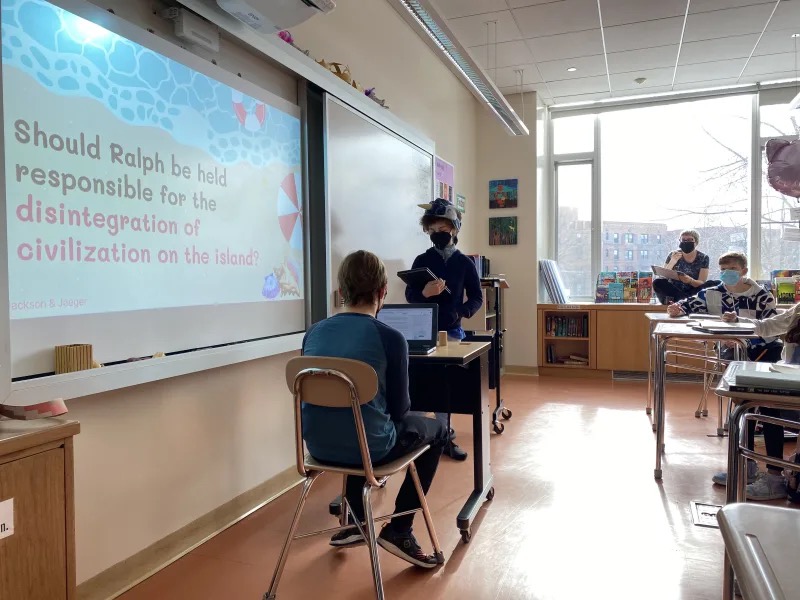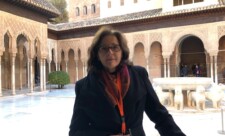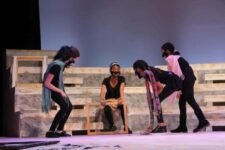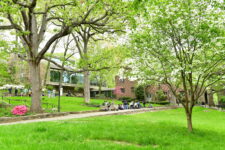Felix Adler, the founder of the Ethical Culture Fieldston School, once said, “The ideal of the school is not the adaptation of the individual to the existing social environment; it is to develop individuals who are competent to change their environment in greater conformity with moral ideals.” At Fieldston Middle, ethics plays a significant role in the core curriculum. Students not only learn complex mathematical equations and literary analysis but they also use those lessons to frame the world around them and to better understand how to go out into the world and change it for the better.
Here are just a few ways that the English, History, Math, and Science Departments at Fieldston Middle incorporate ethics at every turn.

English Department
Every 7th Grade student at Fieldston Middle takes part in the “Lord of the Flies” inquest project: Using evidence from the novel to argue their position, students work in pairs to litigate on behalf of either Jack or Ralph to prove who was to blame for the destructive events in the book. The classroom becomes a mock courtroom as students present their arguments to their classmates.
“Lord of the Flies,” though published nearly 70 years ago, still offers students an engaging and thought-provoking plot to explore. “Ralph and Jack have different approaches to life on the island, and at first, it seems like Ralph is the good guy and Jack is the bad guy. But as the kids push deeper into the book and understand the textual evidence, they start to see arguments they could make in the other direction,” explains Laurie Hornik, English Department Chair. The inquest project teaches 7th Graders about the power of holding multiple perspectives in literature and in life. The novel asks a simple question: What is your responsibility toward other people? Through the inquest project, students at Fieldston Middle use multiple perspectives to find the answer.

History Department
In 7th Grade history, students study maps and geography. The unit includes a section on human geography, which relates to the spatial relationships between humans, cultures, and economies. During this unit, students research an essential question and write an essay outlining their findings. The question: Is it ethical for politicians to create districts that benefit their own parties?
Through research and reporting, the 7th Graders must explain what gerrymandering is, why it is used, what it means to be ethical, and whether or not it is ethical for politicians to create political districts that benefit their party. The students use a mixed-media approach to their research, including written articles and published political cartoons. The students also draw cartoons about gerrymandering to go alongside their essays. The unit offers students the opportunity to dig into an essential question, debate a relevant issue, and better understand an ethical issue in today’s society.

Science Department
During the 2021–2022 academic year, 6th Grade science students participated in an ecological restoration project with Van Cortlandt Park. After meeting with John Butler, Program Director of Restoration and Stewardship with the Van Cortlandt Park Alliance, students researched and created information sheets about various native plants. They developed recommendations for which areas of the park would be most suitable for transplanting based on the ecosystem, land usage, and their knowledge of each plant species. In the classroom, students grew a variety of seeds obtained from the New York City Foundation Seed Program, including gray goldenrod, white and blue woodland astor, switchgrass, little bluestem, and others. The seedlings were later transplanted to Van Cortlandt Park.
Through the ecological restoration project, 6th Graders learned about seed germination and plant structure/function and reinforced their understanding of how environmental conditions can impact plant growth. Partnering with the Van Cortlandt Park Alliance allowed students the opportunity to learn more about the importance of preserving plant species native to New York City while also making a difference in their local community. As of publication, the native transplants are thriving in their new Van Cortlandt Park habitat.

Students not only learn the mechanisms of the stock market but study the real-world implications of how companies choose to operate and the kinds of choices companies can make to benefit the rest of the world.
Math Department
The stock market unit is an exciting learning experience for 6th Grade students each year. Through a real-time simulation, students learn fundamental investing concepts and attempt to increase their portfolio’s value by making informed investment decisions. It’s only possible to explore these concepts by infusing mathematical concepts. Through the unit framework, students delve deeper into decimals, percentages, ratios, and graphing — to name a few. Students not only learn the mechanisms of the stock market but study the real-world implications of how companies choose to operate and the kinds of choices companies can make to benefit the rest of the world.
Students complete the stock market unit by researching companies recognized for ethical board governance or social and/or environmental stewardship. Students create presentations about their chosen companies, and based on financial research, they must decide if it’s a worthwhile financial investment.



